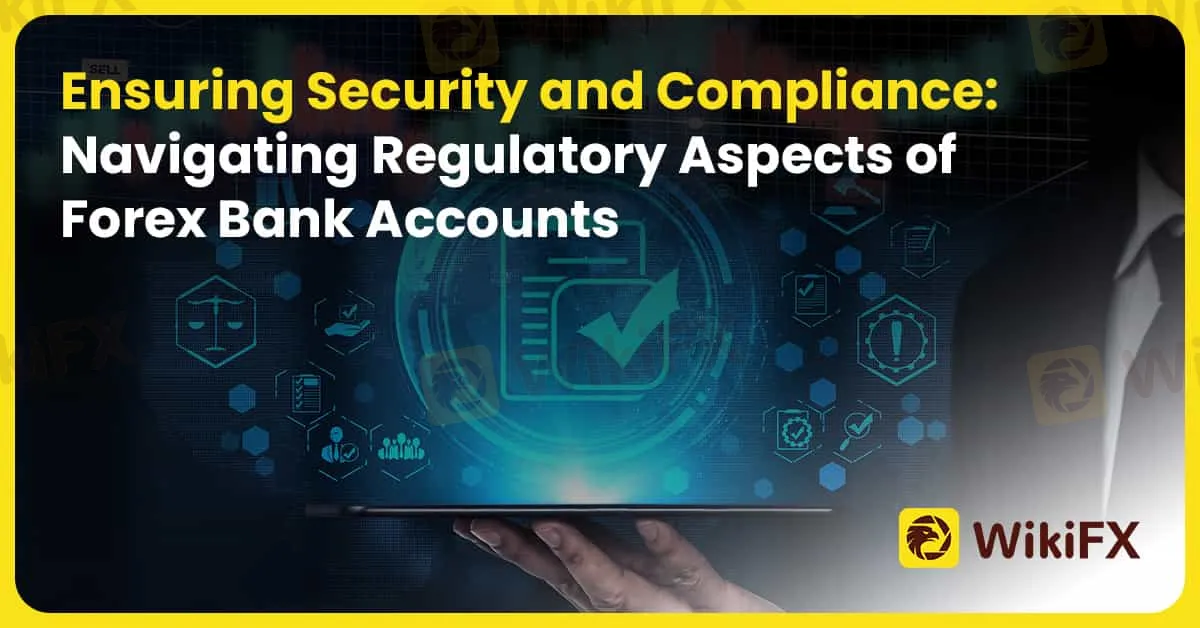简体中文
繁體中文
English
Pусский
日本語
ภาษาไทย
Tiếng Việt
Bahasa Indonesia
Español
हिन्दी
Filippiiniläinen
Français
Deutsch
Português
Türkçe
한국어
العربية
Ensuring Security and Compliance: Navigating Regulatory Aspects of Forex Bank Accounts
Abstract:Forex trading offers lucrative opportunities for investors, but it's crucial to prioritize security and regulatory compliance when selecting a bank account for trading purposes. In the UK and Europe, stringent regulatory standards are in place to safeguard investors' interests and maintain the integrity of financial markets. In this article, we delve into the regulatory aspects of forex bank accounts and explore how traders can ensure security and compliance in their trading activities.

Forex trading offers lucrative opportunities for investors, but it's crucial to prioritize security and regulatory compliance when selecting a bank account for trading purposes. In the UK and Europe, stringent regulatory standards are in place to safeguard investors' interests and maintain the integrity of financial markets. In this article, we delve into the regulatory aspects of forex bank accounts and explore how traders can ensure security and compliance in their trading activities.
Understanding Regulatory Compliance
Regulatory compliance is paramount in the forex industry, as it ensures that banks and brokers adhere to strict standards of conduct, transparency, and investor protection. In the UK, the Financial Conduct Authority (FCA) is the primary regulatory body responsible for overseeing financial markets, including forex trading. Similarly, in Europe, the European Securities and Markets Authority (ESMA) plays a pivotal role in regulating forex trading activities across member states.
Authorized and Regulated Entities
When choosing a bank account for forex trading, it's essential to ensure that the bank is authorized and regulated by the relevant regulatory authorities. Authorized banks are subject to regular audits and inspections to ensure compliance with regulatory standards, including capital adequacy requirements, segregation of client funds, and fair trading practices. By trading with an authorized bank, investors can mitigate the risk of fraud, malpractice, and financial loss.
Investor Protection Measures
Regulatory authorities implement various investor protection measures to safeguard the interests of market participants. These measures may include compensation schemes, whereby investors are eligible for reimbursement in the event of a bank or broker insolvency. Additionally, regulatory authorities impose strict rules on advertising, disclosure, and transparency to ensure that investors have access to accurate and reliable information when making investment decisions.
Risk Disclosure and Education
Regulated banks are required to provide clients with comprehensive risk disclosure statements outlining the potential risks associated with forex trading. These disclosures educate investors about the inherent risks of leveraged trading, market volatility, and potential losses. Furthermore, regulated banks may offer educational resources, seminars, and webinars to help clients understand the intricacies of forex trading and develop effective risk management strategies.
How Wiki Forex Can Help
Navigating the regulatory landscape of forex trading can be daunting, especially for novice investors. This is where Wiki Forex can provide invaluable assistance. As a trusted online resource for forex education and information, Wiki Forex offers expert insights, regulatory updates, and compliance guidelines to help traders navigate the complex regulatory environment.
From understanding the regulatory obligations of banks and brokers to staying informed about regulatory changes and developments, Wiki Forex equips traders with the knowledge and tools they need to trade safely and confidently. By partnering with regulated banks and brokers, Wiki Forex ensures that traders have access to reputable and compliant service providers, thereby enhancing the security and integrity of their trading activities.
In conclusion, regulatory compliance is a cornerstone of forex trading, ensuring the safety and integrity of financial markets. By prioritizing security and compliance when selecting a bank account for forex trading, investors can mitigate risks and safeguard their interests. And with the support of resources like Wiki Forex, traders can stay informed, empowered, and compliant in their forex trading journey.

Disclaimer:
The views in this article only represent the author's personal views, and do not constitute investment advice on this platform. This platform does not guarantee the accuracy, completeness and timeliness of the information in the article, and will not be liable for any loss caused by the use of or reliance on the information in the article.
Read more

April Fool's Day Scam Prevention Experience Collection
Share your “Forex Fraud Prevention Experience”, win WikiFX points and gold rewards!

How Will the Market React at a Crucial Turning Point?
Safe-haven assets like gold and U.S. Treasuries are surging, while equities face mounting pressure. As this pivotal moment approaches, how will the market react?

Gold Prices Climb Again – Have Investors Seized the Opportunity?
Gold prices have hit record highs for three consecutive days, with a remarkable 19% gain in the first quarter, marking the strongest quarterly performance since 1986. As market risk aversion rises, demand for gold has surged significantly.

Will natural disasters have an impact on the forex market?
The forex market is known for its rapid responses to global events, but the influence of natural disasters, such as earthquakes and typhoons, can be less straightforward. While headlines may scream about catastrophic damage and economic disruption, the long-term effects on currency values often depend on a blend of immediate shock and underlying economic fundamentals.
WikiFX Broker
Latest News
How Crypto Trading Transforms FX and CFD Brokerage Industry
FCA Warns Against 10 Unlicensed or Clone Firms
CySEC Warns Against 14 Unlicensed Investment Websites
Top Currency Pairs to Watch for Profit This Week - March 31, 2025
Will natural disasters have an impact on the forex market?
Philippines Deports 29 Indonesians Linked to Online Scam Syndicate in Manila
Exposing the Top 5 Scam Brokers of March 2025: A Closer Look by WikiFX
Gold Prices Climb Again – Have Investors Seized the Opportunity?
Webull Launches SMSF Investment Platform with Zero Fees
Australian Regulator Warns of Money Laundering and Fraud Risks in Crypto ATMs
Currency Calculator







